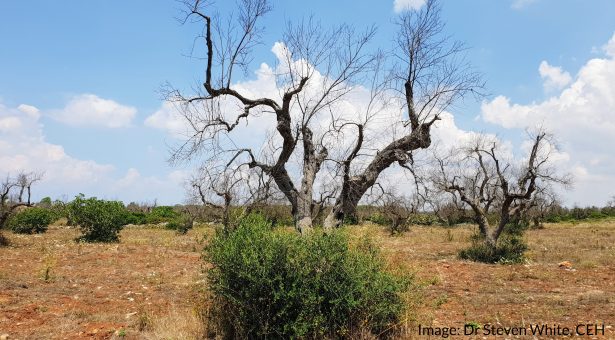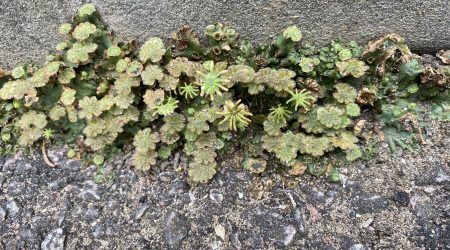New controls to protect UK trees and plants against damaging threats

Strict national measures take effect today to safeguard the UK from a range of plant health threats, in particular the devastating disease caused by Xylella fastidiosa.
The regulations include more stringent import requirements to protect UK plant health against threats to natural habitats and forestry and horticulture industries.
To address the Xylella threat, the new rules include a ban on the import of Coffea (coffee plants) and Polygala myrtifolia which are particularly susceptible to the disease . They also include stronger import requirements for other high-risk hosts (olive, almond, oleander, lavender and rosemary).
Xylella fastidiosa, a bacterial pathogen, is not in the UK yet but has devastated the olive industry in Italy and is a growing economic and environmental threat across southern Europe.
The John Innes Centre is leading a UK-wide consortium, BRIGIT, to generate the evidence and understanding needed to reduce the risk of Xylella being introduced,
Professor Saskia Hogenhout, leader of the consortium at the John Innes Centre, said: “We welcome these new regulations which will be a key step in keeping the UK free from Xylella. Through the BRIGIT programme we are investigating how Xylella may spread in the UK environment, by assessing how symptoms may develop in plants, the prevalence and movement of insect vectors and how the disease may move around the country via transport of plants. We also organise public engagement events to distribute information about Xylella and risks associated with importing ornamental plants into the UK.
“All of these components are vital in developing an effective regulatory framework to manage the threat posed by the disease.”
Unlike some other plant killers such as Ash Dieback and Dutch Elm Disease, Xylella is non-specific. The bacterial disease is spread from infected plants by insect vectors such as froghoppers (spittlebugs) and leafhoppers. It can infect more than 550 species of trees, plants and crops, causing leaf scorch, wilt, die-back and may lead to plant death. There is no known cure for the disease.
UK Chief Plant Health Officer Nicola Spence said: “Protecting our country from tree pests and diseases is key to protect our environment, economy and our health.
“That is why we are introducing tighter restrictions on the importation of high–risk host plants and trees for Xylella, emerald ash borer and plane wilt.
“Xylella is a major threat to our landscape and industry and in this year of International Plant Health it is more imperative than ever that we do all we can to ensure the UK remains a Xylella-free zone. Emerald ash borer and plane wilt also represent significant threats, which is why we are bolstering our protection against them, in response to recent changes in the risk situation.”
The new legislation is amending the Official Controls Regulations 2019, to address new plant health threats. It also includes measures against:
- Emerald ash borer (beetle) a damaging pest of ash species. New measures applying stronger import controls to countries within 100km of confirmed outbreak areas. This includes the removal of an option, within EU legislation, to remove the bark and sapwood to a depth of 2.5 cm for all countries regulated for emerald ash borer. This will help mitigate the risk of importing infected wood which has not properly met the official requirements
- Plane tree wilt – More stringent ‘Protected Zone’ requirements for the UK including measures for plane trees, intended for planting other than seeds, which must now have been grown throughout their life in a pest free area or an EU Protected Zone. The new requirements apply to imports to the UK from Albania, Armenia, Switzerland, Turkey, the United States and the EU-27
The legislation will also amend an area of the EU Plant Health Regulation concerning the plant disease Elms Yellows and the UK’s Protected Zone. Elm yellows is a plant disease of elm trees that is spread by leafhoppers or by root grafts.
In a video released earlier this spring Dame Helen Mirren – who has experienced at first hand the devastation caused by Xylella in Puglia in Italy – urged people to observe some simple rules to help keep the UK free of Xylella. They include:
- Source new plants carefully, where possible purchase plants grown in the UK
- Check plants for signs of disease before purchase and monitor the health of new plants
- Never bring plants back with you from abroad
The top image shows Xylella fastidiosa in olive trees in Puglia, Italy by Dr Steven White (CEH).



